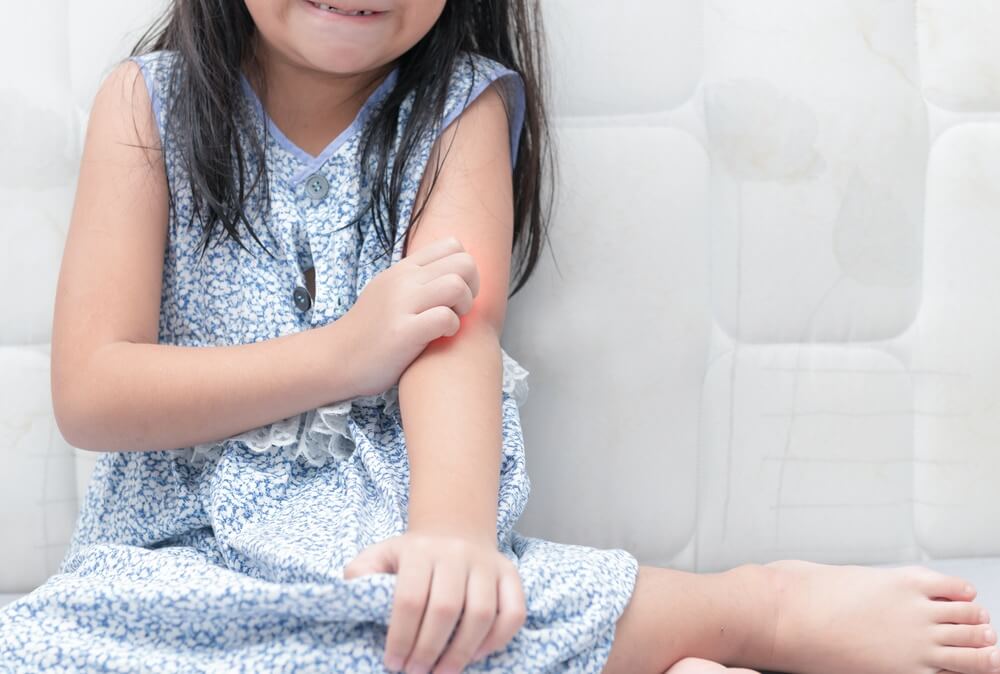What To Do If a Child Has an Allergic Reaction (Mild or Severe)
Conditions
•
Mar 30, 2021
Reviewed by: Jeffrey Peebles, M.D

It’s important to know what to do if a child has an allergic reaction. Knowing the correct steps after spotting signs of an allergic reaction can mean the difference between life and death. But how do you know the difference between a mild allergic reaction and a severe one? At what point should you take the next step and call 911? How do you relieve an allergic reaction if it isn’t severe?
The health experts at Complete Care cover the ins and outs of what to do if a child has an allergic reaction so you’ll be better equipped to handle this very serious situation.
What are the signs and symptoms of an allergic reaction?
You can’t spot an allergic reaction if you don’t know what to look for. And you won’t know if you should take things to the next level if you can’t differentiate between a mild allergic reaction and a more severe, anaphylactic reaction. So, here’s a simple guide that can help you identify the symptoms and differences between a mild and severe allergic reaction.
Mild allergic reaction
- Patchy red skin (hives/bumps may be present)
- Itchy, watery, red eyes
- Runny or stuffy nose and sneezing
- Itchy skin or throat
Severe allergic reaction
- Difficulty swallowing or breathing (it may feel as if your throat is swollen or constricted)
- Throwing up / nausea
- Diarrhea / stomach pain
- Swelling of the eyes, tongue, or face
- Dizziness or light-headedness
- Fast or irregular heartbeat
Once the allergic reaction switches from surface-level issues (itching, redness, etc) to internal issues (difficulty breathing and swallowing) that’s when you can say, “This is an anaphylactic response, and we need to seek out professional help ASAP.”
Learn More: Here’s when to go to the ER for an allergic reaction.
Steps to take if your child has an allergic reaction
Once you’ve noticed the signs and symptoms of an allergic reaction and identified whether or not it’s a mild or severe reaction, then you can figure out how to properly care for your child.
A child having an allergic reaction can be a high-stress situation, especially if it’s an infant or toddler allergic reaction. They’re so small, and they don’t know how to express what they’re feeling — so it can be an emotional and scary time. But as long as you remain calm and take immediate action, you should be fine.
Here’s what we recommend during an allergic reaction:
Immediately pause everything
If you’re feeding your child or if they’re handling something (plants, animals, etc.), quickly remove them from the situation.
Analyze the symptoms
Take the time to determine if the child is experiencing mild or severe symptoms, and make care decisions based on your determination. If things are not serious initially, you’ll want to carefully watch your child over the next few hours to make sure things don’t worsen.
Do not assume that the situation will get better on its own; do not assume that things won’t escalate quickly, and do not assume the situation isn’t serious simply based on previous experiences (or lack thereof — ex. “The child has never responded this way before, so things are probably okay”).
If anaphylaxis is present
- Call 911.
- If the child is having issues breathing, lay the child down with their legs raised. If the child is throwing up, lay them on their side.
- If an epi-pen is available and the reaction is severe enough, administer the medication.
- Do not give your child Benadryl or other medication by mouth if they’re having trouble breathing.
Learn More: Tips on what to do when someone is in anaphylactic shock.
If anaphylaxis is not present
If the child has a mild allergic reaction with no breathing problems or stomach pain present, then antihistamines, such as Benadryl, are usually recommended. However, it is extremely important to follow your doctor’s recommendations and the instructions on the medication. If your child is under the age of 2, it’s recommended to seek out advice from your doctor before giving them an antihistamine.
If they’re itching a lot due to an allergic reaction to bug bites or an animal, a cool, moist towel or a cold bath can help relieve some of the itchiness. If you don’t decide to put them in the bath, it’s always a good idea to change their clothes and wash their hands and face (especially if the allergic reaction is from plants or animals).
24-Hour Support for Allergic Reactions at Complete Care
If you’re not sure what to do if a child has an allergic reaction, we’re here for you. It’s always better to seek out immediate, professional help for an allergic reaction than to wait and suffer permanent, life-altering consequences.
At Complete Care, our state-of-the-art facilities and award-winning doctors and nurses are well equipped to give patients who are experiencing a severe allergic reaction and/or anaphylactic shock the professional, emergency medical treatment they need.
We have ER locations in both Texas (Austin, Corpus Christi, San Antonio, Dallas/Fort Worth, East Texas, and Lubbock) and Colorado (Colorado Springs). Whether you have an emergency or just a simple health question, we will take complete care of you.
More Helpful Articles by Complete Care:
